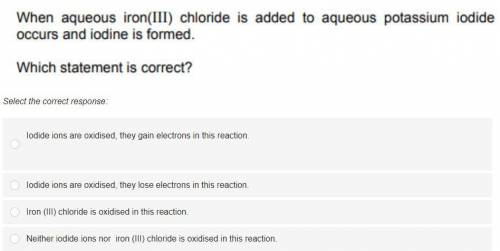
Chemistry, 21.02.2021 15:10 PencilLover101
When aqueous iron(III) chloride is added to aqueous potassium iodide occurs and iodine is formed.
Which statement is correct?
a. lodide ions are oxidised, they gain electrons in this reaction.
b. Neither iodide ions nor iron (III) chloride is oxidised in this reaction.
c. lodide ions are oxidised, they lose electrons in this reaction.
d. Iron (III) chloride is oxidised in this reaction.


Answers: 3
Another question on Chemistry

Chemistry, 22.06.2019 05:00
Type the letter that represents the correct location for each particle type below.
Answers: 1

Chemistry, 22.06.2019 09:10
Which class of molecules functions as chemical signals? hormones water carbohydrates proteins
Answers: 1

Chemistry, 22.06.2019 14:00
The content of manganese (mn) in steel was determined spectrophotometrically and with the use of the standard addition method. an unknown sample of mn from a digested steel sample gave an absorbance of 0.185 when analyzed spectrophotometrically. when 5.00 ml of solution containing 95.5 ppm mn was added to 50.0 ml of the unknown steel solution (digested sample), the absorbance was 0.248. calculate the concentration, in parts-per-million (ppm), of mn in the digested steel sample solution.
Answers: 3

Chemistry, 22.06.2019 17:10
In which block of the periodic table is uranium (u) found? s blockd blockp blockf block
Answers: 1
You know the right answer?
When aqueous iron(III) chloride is added to aqueous potassium iodide occurs and iodine is formed.
W...
Questions

Mathematics, 15.04.2021 20:10


Mathematics, 15.04.2021 20:10

Mathematics, 15.04.2021 20:10









Mathematics, 15.04.2021 20:10






History, 15.04.2021 20:10




